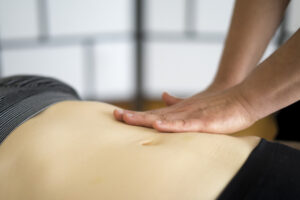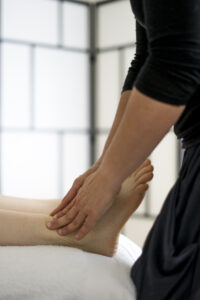
{This was originally published one year ago…}
Depression is a very prevalent mental disorder affecting 340 million people globally and is projected to become the leading cause of disability and the second leading contributor to the global burden of disease by the year 2020.
(And here we are amidst a global pandemic #Covid19… wow, just WOW!!!)
While we think of depression as more a mental health issue, it also affects your physical health and well-being – in more ways than you can probably imagine!
Having experienced depression myself in the past, I can attest to the fact that it’s a full-body experience. Interestingly, living with chronic anxiety and depression is what actually got me into remedial massage, yoga, and holistic & functional movement as a profession, as I personally experienced the healing powers of these “touch therapies” myself.
Let’s learn more about some of the most common symptoms of depression, including how it can affect your entire body, especially if left untreated.
Please remember that if you’re experiencing symptoms of depression — you are not alone, there is nothing “wrong” with you, and there IS support for you!
How is depression different than just having a “low mood” or “feeling down”?

In general, a low mood can be a combination of feelings of sadness, anxiety, worry, fatigue, frustration, anger, and frustration. These feelings tend to lift after a few days or possibly weeks if you’re particularly stressed or dealing with a big life change.
Depression, on the other hand, is a low mood that doesn’t go away after 2 weeks or more, and can sometimes even last for years.
Along with some (or all) of the feelings of a low mood, you may also be sleeping more or less than usual, eating more or less than usual, using alcohol or drugs to cope, have feelings of hopelessness, not getting enjoyment out of life anymore, and have suicidal thoughts or feelings of self-harm.
Depression can also come on at certain times in your life, like seasonally – typically during the colder, darker Winter months (Seasonal Affective Disorder) and post-partum, but for some people, more prevalent in women – it can be chronic and long-standing with no known trigger or cause.
Did you know that more than 1 in 10 women experience a clinically significant depression in the first year postpartum and a similar incidence has been reported during pregnancy?
~ Australian Psychology Society
What body systems does depression affect?
The short answer would be ALL OF THEM. Very much like chronic stress affects us on a cellular level, impacting nearly every one of our body systems – depression can have a similar global physiological effect.
Let’s break it down, system by system…
BRAIN & CENTRAL NERVOUS SYSTEM
Those with depression may have cognitive symptoms such as an inability to focus or concentrate, issues with memory, and difficulty making decisions. This can make it hard to maintain normal work habits or keep up with social activities.
Older adults may find it difficult to identify the cognitive changes that can occur with depression because it can be easy to dismiss some of the signs of depression as just “getting older”.
CARDIOVASCULAR SYSTEM
Depression and stress are intimately intertwined. As we talked about in THIS ARTICLE, stress hormones (adrenaline and cortisol) speed up heart rate and cause blood vessels to tighten, putting your body in a crisis state.
But, as you can imagine being in a chronic state of stress and “emergency” – this can lead to heart disease. In fact, recurrences of cardiovascular problems are more closely linked to depression than to other health condition.
DIGESTIVE SYSTEM
Depression plays a significant role in appetite as some people cope with their low feelings by overeating or bingeing, and not surprisingly, this can lead to weight gain and obesity-related illnesses, such as type 2 Diabetes.
On the other end of the spectrum, a person with depression may lose their appetite completely, or fail to thrive by eating nutrient-rich food. Older adults can experience a sudden loss of interest in eating, lead to a condition called geriatric anorexia, due to depression.

Depression-related eating issues can then lead to digestive symptoms like:
- Cramps & stomach pain
- Constipation &/or diarrhea
- Malabsorption of nutrients/malnutrition
REPRODUCTIVE SYSTEM & HORMONES
Stress, fatigue, low mood, and depression may all reduce sexual desire — especially when women are simultaneously caring for young children or an aging family member, coping with chronic medical problems, experiencing relationship difficulties or abuse, dealing with work problems, etc.
For men, ongoing stress over an extended period of time, can affect testosterone production, sperm production, and maturation, and even cause erectile dysfunction or impotence.
MUSCULOSKELETAL SYSTEM>> Read about how stress and depression can even affect our muscles!
How to combat the physical & mental effects of depression
 Check your self-talk! Begin to take notice of what you say to yourself, and work on using more supportive, calming and encouraging self-talk, i.e. change the narrative you use with yourself… is it helpful, or harmful?
Check your self-talk! Begin to take notice of what you say to yourself, and work on using more supportive, calming and encouraging self-talk, i.e. change the narrative you use with yourself… is it helpful, or harmful?- Incorporate an exercise routine and holistic & functional movement into your day
- Nutrition that supports the brain and your mental health (mood food!), not to mention it can fight pain & inflammation
- Try meditation, deep breathing and a regular yoga practice
- Engaging in more social situations and seeking support from trusted family and friends
- Use more “touch therapies” like remedial massage and structural integration (types of bodywork), as well as learning self-massage techniques for better body awareness and a stronger mind-body connection.
DID YOU KNOW? The power of touch is incredible and it all comes down to a little hormone called Oxytocin that is released when we are hugged or touched and that accounts for those feelings of warm ‘n fuzzies!
If you do need additional support and guidance from a trained mental health professional —
you can try the Find A Psychologist Directory in Australia.
REFERENCES:
Irish Journal of Medical Science (June 2011): Effects of Exercise and Physical Activity on Depression
Healthline: The Effects of Depression in Your Body
NHS Moodzone: Low Mood and Depression
Australian Psychology Society: Depression resource page